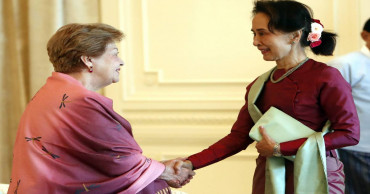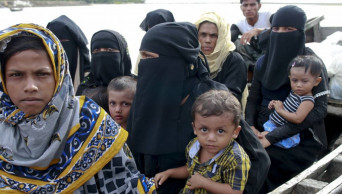Rohingya problem
Rohingya problem needs a regional solution, Australian security expert writes
Trouble is once more breaking out at the Bangladesh-Myanmar border. Following multiple military incursions by the Myanmar military across the border, the Bangladesh Army is on high alert and is reviewing its options. Regarding Bangladesh's intentions to begin repatriating Rohingya refugees who are not accepted in their country, both parties are attempting to position themselves.
As this most recent altercation develops, it becomes clear that the Rohingya problem requires a regional solution, writes Dr David Brewster – one of Australia’s leading academic experts on strategy and security in the Indian Ocean region and South Asia – in Lowy Institute’s The Interpreter.
The Tatmadaw, the Myanmar military, has increasingly violated Bangladeshi territory over the past few weeks. This has included helicopter and jet overflights as well as shelling of areas close to Bangladeshi villages. The most recent incident occurred on September 16 and entailed a mortar attack on the refugee camp in "No Man's Land," which is located directly on the border between Bangladesh and Myanmar. The narrow border between the two nations has stranded thousands of Rohingya refugees for years. In the incident last week, five people were hurt, including Bangladeshis, and at least one person died.
These events can be considered a spillover from the ongoing separatist struggle in Rakhine State, Myanmar. But Bangladeshi officials privately feel that the Tatmadaw is deliberately attempting to sabotage the border between Myanmar and Bangladesh in order to thwart the planned return of Rohingya refugees to Myanmar. They wonder whether it is merely a coincidence that these episodes took place a few days before Bangladesh Prime Minister Sheikh Hasina's speech to the UN General Assembly, during which she would ask for support from other countries for Bangladesh's intentions to repatriate the Rohingyas.
Read: Hasina breaks down in tears while talking about everyday ordeals of Rohingyas
Since 2017, after being ethnically cleansed from Rakhine State by Myanmar government forces and local nationalist groups, about one million Rohingya refugees have sought safety in Bangladesh. As their fate is increasingly in doubt between Bangladesh and Myanmar, a conflict between the two nations is theoretically on the horizon if the issue is not handled, Dr Brewster writes.
With aid from the international community, Bangladesh has established sizable camps close to the Myanmar border as a kind host for the Rohingya refugees. But as financing and attention from abroad dwindle and local Bangladeshi groups grow more hostile to the refugees, the pressure on the Bangladesh government from inside grows. The Bangladesh government must appear to be making serious efforts to repatriate refugees or find other places for them to live since elections are scheduled for the next year.
Early in 2022, Bangladesh and Myanmar resumed talks to repatriate a small number of Rohingyas to that country, with China helping to fund the construction of at least three receiving centres inside Myanmar. The pressure on Myanmar is now being increased by Bangladesh, who is also backing a case brought by the Gambia before the International Court of Justice alleging Myanmar of committing genocide. The UN General Assembly talk Sheikh Hasina gave this week is a part of an effort to keep the Rohingya problem, including their repatriation, in the public eye.
However, there is no reason to think that the Rakhine nationalists or the Myanmar government, who forcibly ejected the Rohingyas, would ever welcome their return. In fact, there has recently been discussion about removing even more of the surviving Rohingyas from Myanmar.
The latest border events are being viewed by the Bangladeshi administration in the context of its efforts to mobilise the international community in support of repatriations. The Tatmadaw's actions seem designed to elicit a reaction from Bangladesh. Planned repatriations could be stopped and more refugees could leave Myanmar under the cover of an insecure border and the fighting in Rakhine State, Dr Brewster writes.
3 years ago
President urges world leaders to take effective steps to solve Rohingya problem
President Abdul Hamid on Thursday called upon the world leaders including from Germany to take effective initiatives to have a permanent solution to the Rohingya problem.
Visiting President Hamid made the call during a meeting with German President Frank-Walter Steinmeier at his official residence Bellevue Palace.
During the meeting, the President thanked the German government for providing humanitarian assistance to the Rohingya who were forcibly displaced from Myanmar and for raising the issue at the United Nations, President’s Press Secretary Joynal Abedin told UNB.
The Bangladeshi President also called for effective measures to repatriate Rohingyas to their homeland.
Mentioning Germany as a reliable development partner of Bangladesh, the President highlighted the issue of German co-operation in the development of Bangladesh since independence.
He thanked the German government for sending the corona vaccine and medical equipment to Bangladesh as a grant.
Stating that the existing trade relations between Bangladesh and Germany are very good and are expanding day by day, Abdul Hamid called for more German investment in various sectors, including Bangladesh's high-tech parks and special economic zones.
The President praised the new steps taken by Germany and the European Union to address the adverse effects of climate change.
He hoped that Germany and the European Union would be more liberal in their trade and investment with developing countries, including Bangladesh.
Expressing gratitude for launching the Bangabandhu Professional Fellowship at the University of Heidelberg in Germany, the President called for visa facilitation for Bangladeshi students.
The President said Bangladesh is moving ahead economically because of the government's zero-tolerance policy against terrorism and extremism.
Alongside, Hamid thanked the German President for his speech on the occasion of the golden jubilee of Bangladesh's independence and the birth centenary of Father of the Nation Bangabandhu Sheikh Mujibur Rahman.
Expressing satisfaction over Germany's bilateral trade with Bangladesh, the German President emphasized exchanging visits at the public-private level to increase trade between the two countries.
Appreciating Bangladesh's initiative in controlling the Corona epidemic, the German President said that his country would continue its cooperation in this regard.
During the meeting, they also discussed various issues including international politics.
Secretary to the President's Office Sampad Barua, Military Secretary Major General SM Salah Uddin Islam, President's son Rasel Ahmed Tuhin and Bangladesh Ambassador to Germany Mosharraf Hossain Bhuiyan were present during the meeting.
4 years ago
Bangladesh shouldering Rohingya burden for govt’s ‘knee-jerk’ policy: BNP
BNP Secretary General Mirza Fakhrul Islam Alamgir on Tuesday said the government has not been able to resolve the Rohingya crisis due to its ‘knee-jerk’ foreign policy.
5 years ago
Myanmar panel: Security forces likely committed war crimes
An independent commission established by Myanmar's government has concluded there are reasons to believe that security forces committed war crimes in counterinsurgency operations that led more than 700,000 Rohingya Muslims to flee to neighboring Bangladesh.
6 years ago
Concentrate on your obligations, commitments: Bangladesh to Myanmar
Dhaka, Aug 25 (UNB) - Bangladesh has urged Myanmar to fully concentrate on implementation of its obligations and commitments necessary for a durable solution to the Rohingya problem.
6 years ago








